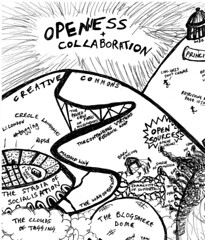When you use a tag editor that automatically fixes your metadata you should really have a think about where that data comes from.
There are a number of databases containing music information but some of these such are closed, this means you cannot actually browse the data independently never mind correct errors in the database. Often applications that use these type of database keep the identity of their source database hidden.
Accuracy
Sometimes the data is not very accurate. this may be because a database is not being used at all instead the tagger may just trying to hack information from websites and other sources
Linking
An online database can be used to correct your song metadata but for you to take adavantage of a myriad of other interesting applications you need to store a unique id that accurately identifies your song so you dont have to fuzzy match it again.
Metadata and Acoustic Matching
Matching songs by metadata is good but matching by the actual audio can be even better, but you need both: matching by Acoustic Id might identify the correct song but if the song exists on multiple releases it cannot help select the correct release.
The Jaikoz Solution
Openness
The primary database used by Jaikoz is MusicBrainz, MusicBrainz is a completely open database run by the non profit Metabrainz Foundation that can be edited by anybody with a free account. Jaikoz also uses as secondary source Discogs another online database that allows the data to be browsed and edited and freely downloaded.
AccuracyMusicBrainz has comprehensive guidelines on the editing process and voting system to ensure the quality of edits and to protect the database from poor edits. Discogs also has guidelines and only allows adding of releases that you own, both systems expect the editor to provide another source for their edits.
LinkingMusicBrainz provides unique identifiers for songs, releases and artists (plus some others) and these identifiers are increasing being used by other sites such as Last.fm and the BBC,in fact Musicbrainz Artist Ids are fast becoming an industry standard. Discogs does not have such a sophisticaed system but when a release is matched to Discogs we store the the Discogs Release Url in your songs metadata.
Metadata and Acoustic MatchingJaikoz uses AcoustId in addition to metadata matching to ensure the best possible match. Acoustid is yet another open system that you can contribute songs to and you can also flag when an acoustic id seems to be assigned to an incorrect song.
Overall at Jthink we are committed to using the best sources available.


No comments:
Post a Comment